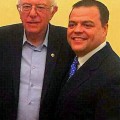Helping the Financially Underserved Join Today’s Modern Economy
Economic inequality is a pervasive problem in the United States. One of the often overlooked issues driving this inequality is the exclusion of lower and middle-income families, especially Latinos, from the modern economy. With the Latino population expected to reach 106 million by 2050, ensuring universal participation in the digital marketplace is more important than ever. Our success as a community ultimately hinges on our ability to adopt new technologies that are revolutionizing commerce and reinventing the banking experience.
A national survey conducted by the Federal Deposit Insurance Corporation (FDIC) found that more than 46 percent of Hispanic households in the United States are financially underserved, meaning they have no or only a limited relationship with a traditional banking institution. Here in the New York City area, this grows to more than 50 percent. As borough president of the Bronx for nearly 15 years, I often saw the challenges facing these families.
Financially underserved families are often driven to use costly alternative financial services that make the accumulation of wealth difficult—if not impossible. The average financially underserved household has an income of $25,500 and spends nearly 10 percent of that on interest and fees for services like check cashing, money orders and payday loans, according to a U.S. Postal Service Inspector General report. This money should be going to more important uses, like saving for college or a down payment on a home.
During this Financial Literacy Month, it’s important to remember that a key part of financial inclusion today is access to electronic payment technology, which has grown to encompass tools like traditional credit and debit cards, prepaid and payroll cards, and mobile wallets. Prepaid payroll cards, in particular, offer financially underserved Latino families the opportunity to save time and money by entering the mainstream digital economy.
Payroll cards that are affordable and fair can help the underserved in two significant ways. First, they allow unbanked workers to receive wages through direct deposit rather than a paper check. This means that employees can avoid the cost and hassle of using check-cashing services and money orders to manage their money. Secondly, payroll cards are more secure than carrying cash. People can avoid carrying large amounts of cash that put them at significantly higher risk of theft or loss.
While electronic payment technology has revolutionized personal finance, these tools are only beneficial to people who know how to obtain and use them. This is why financial education is a vital component to any effort to bring Latinos into the economic mainstream and the main reason I’ve worked with Master Your Card: Oportunidad, a community empowerment program, is to bring education and resources to financially underserved Latinos in the Bronx and throughout New York. Together, we have an ongoing partnership with the New York Hispanic Chamber of Commerce and hosted a Financial Resource Fair, and are now preparing to launch a series of workshops for small business owners. Through these efforts, we are delivering vital information that expands knowledge and access within a community that is often forgotten or marginalized.
Embracing electronic payment technology is a positive first step toward financial inclusion and helps Latinos spend less of their hard-earned money on expensive alternative financial services. Payroll cards are just one way in which families can avoid these unnecessary costs and shrink the gap of economic inequality.
Fernando Ferrer is vice chairman of the board for New York City’s Metropolitan Transportation Authority, former Bronx borough president and a member of the Master Your Card: Oportunidad Advisory Board.














Follow Us